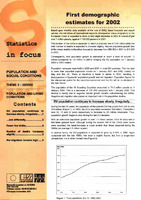Statistics in Focus: Population and social conditions. First demographic estimates for 2002.

Working Document
Συγγραφέας
EU Commission
Ημερομηνία
2002-12-16Προβολή/
Θεματικές επικεφαλίδες
Social Europe ; Social policy ; DemographicsΠερίληψη
Based upon monthly data available at the end of 2002, latest forecasts and expert opinion, the net inflow of international migrants (immigration minus emigration) to the European Union is expected to show a very slight decrease in 2002 to a level of just over 1 million people, against 1 150 000 persons in 2001. The number of live births is expected to reach a post-war low of 3.99 million while the total number of deaths is expected to increase slightly. Natural population growth (live births minus deaths) is therefore forecast to decrease from 369 000 in 2001 to 315 000 in 2002. Consequently, total population growth is estimated to reach a level of around 1.3 million (compared to 1.5 million in 2001), bringing the EU population on 1 January 2003 to 378.5 million. Population censuses were held in 2000 and 2001 in most EU countries. This has lead to lower than expected population counts on 1 January 2001 and 2002, notably for Italy and the UK. There is therefore a break in series in 2000, resulting in discrepancies in figures for population growth and net migration. Population figures for the intercensal period for the countries concerned and the EU will be recalculated in the near future. The population of the 10 Acceding Countries amounted to 74.5 million people on 1 January 2003. This is a decrease of 135 000 compared with 1 January 2002. This decline is mainly due to negative natural growth (deaths outnumbering live births). Negative net migration also played an important role in the population decline.
